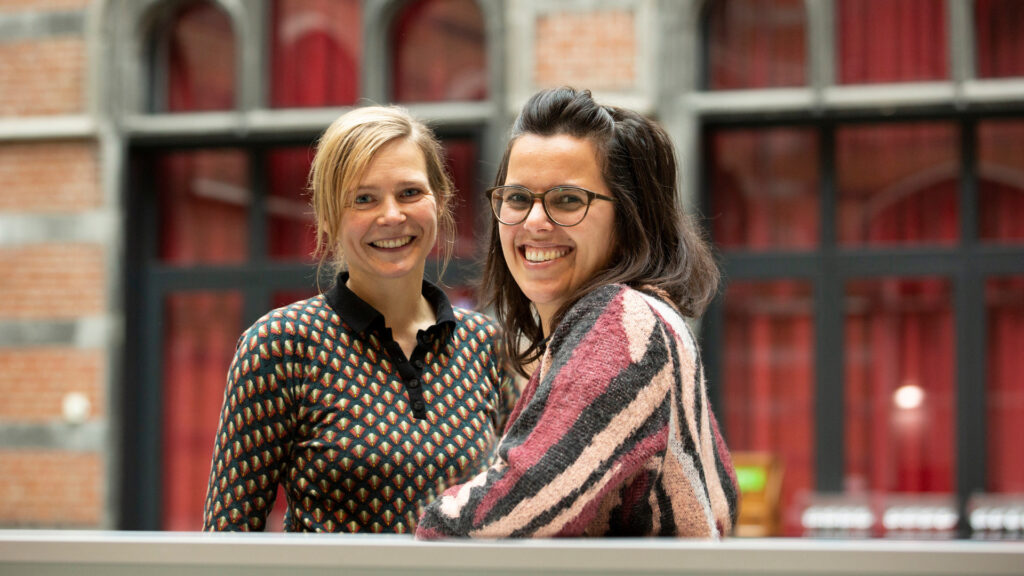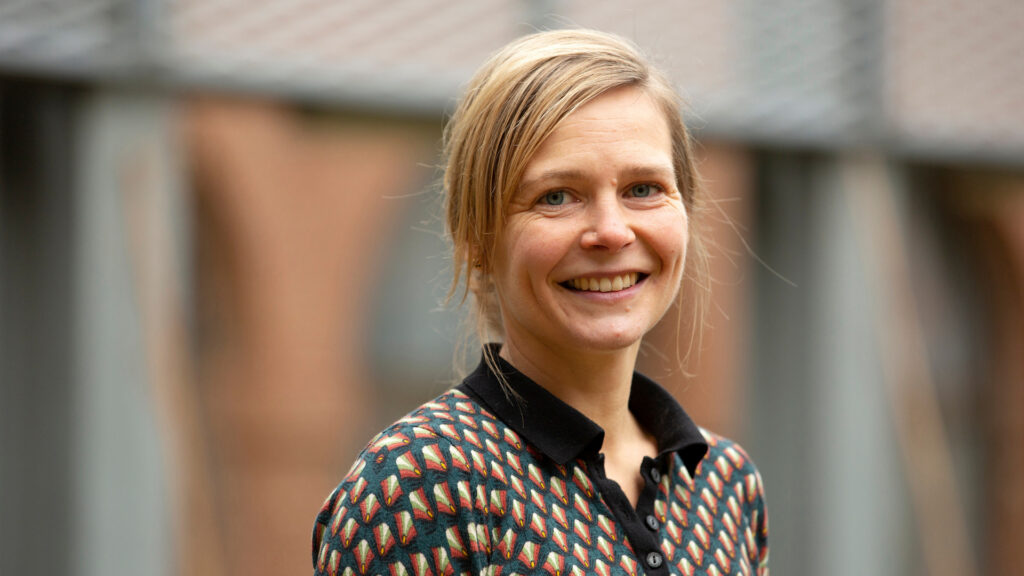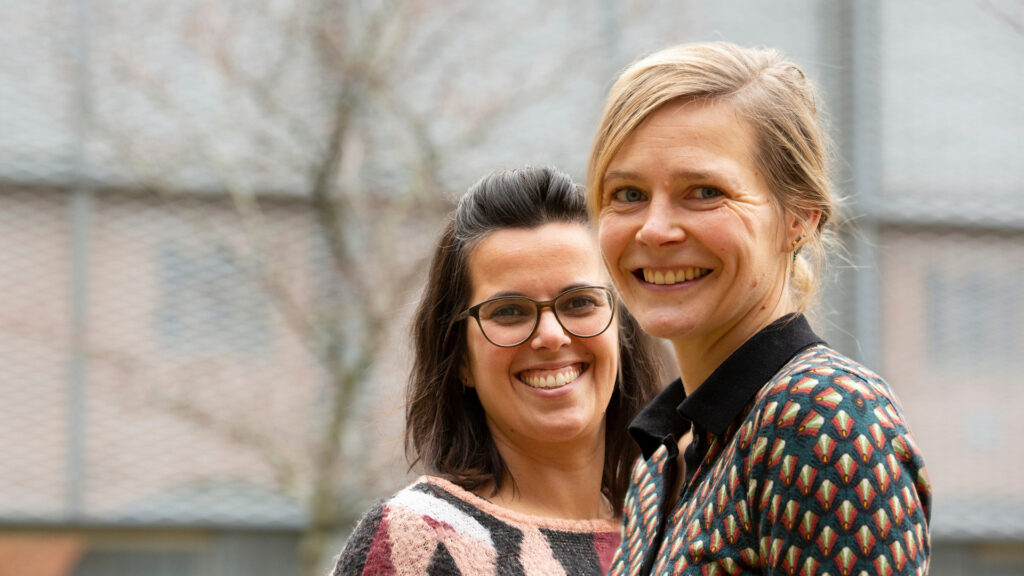Steffi Cornwell and Joëlle Dhondt are 2 of the 14 confidential advisors at our university. Do you face harassment, violence, discrimination or unwanted behaviour at work? Or are you suffering from stress at work or a nasty conflict with a colleague that is escalating? Then you can turn to them.
Both Joëlle and Steffi have been confidential advisors at our university for three and five years respectively. This a voluntary commitment in addition to their normal job, which means that confidential advisors carry out these extra duties from intrinsic motivation, interest and passion.
‘I studied to be a translator-interpreter’, Joëlle explains, ‘but I have always been interested in psychology. So I studied social psychology and now work as a communications officer at the IOB. In that job, I come into contact with different cultures and their associated communication problems. I find that I really like the extra commitment of being a confidential advisor. I think it is important that people feel good in their jobs. It can happen to anyone that sometimes you suddenly can’t see the wood for the trees. There are several initiatives at IOB around mental well-being in the workplace and it is nice to be involved in them.’

‘I studied to be a pharmacist’, Steffi says, ‘but I now work as a study programme counsellor at the Faculty of Applied Engineering. I had been an ombudsperson for some time, and when we were seeing how we could professionalise the ombudsperson training, I took the confidential advisor training. This is a very useful training that all confidential advisors at our university are required to take. It covers the legal framework, psychosocial interventions and risks at work, conflict mediation, risk analysis, trauma and suicide, etc. Every year there is at least one legally required intervision session to keep us up to date. Themes covered at these intervision sessions and other refresher courses include interview techniques, connecting communication, diversity, mediation in social cases, etc.’
Not tied to a faculty
The confidential advisors are not tied to a faculty, so you can choose the confidential advisor with whom you feel most comfortable. ‘In some cases people from your own faculty visit you, and if both parties are comfortable enough with that, it is certainly possible’, Joëlle says. ‘In a conversation about stress complaints, you can remain perfectly neutral; in a conflict between two colleagues you both know, it is sometimes a bit more challenging. However, in my experience, knowing both parties can ensure that you know just the right way to mediate in a conversation. You can better respond to their body language and facial expressions. I remember a conversation that went beautifully and serenely because of mediation.’
‘Within the faculties and departments, the expertise of the confidential advisors is increasingly acknowledged and recognised’, Steffi adds, ‘as a result of which we are also involved in the creation of “safe spaces” and initiatives around inappropriate behaviour.’
How to reach our confidential advisors?
‘Most employees reach out to us by sending an email’, Steffi shares. ‘On Pintra, there is a list with all the confidential advisors and our contact details. We are legally obliged to schedule an initial conversation within 10 days of that email.’
‘And then we agree on a place to meet’, Joëlle says. ‘Some prefer not to meet at their own department but prefer to go for a walk, for example, or choose a neutral place. During that initial conversation, we let the “requester” tell their story and try to get a clear idea of the context of their complaint.’

‘During that first conversation, we also clearly state clearly what our role as confidential advisors is, and that we are bound by professional secrecy’, Steffi adds. ‘This immediately clarifies the expectations. At the end of that first session, we record follow-up actions on an “authorisation form”.’
‘We see that for many, the barrier for going to a confidential advisor is very high’, Joëlle finds. ‘Trusting someone you don’t know is not easy. But once past that barrier, most indicate that having a friendly informal conversation did them a lot of good.’
What types of issues?
‘If employees have persistent stress complaints due to their job, we provide the buffer for having an initial conversation’, Joëlle believes. ‘We are part of the Dynamic Risk Management System: we are part of the preventive measures, namely to limit damage and provide a first listening ear. If there is a conflict between two employees, the emphasis is on “reconciliation”. We try to get both sides to sit around the table and to get back on speaking terms.’
‘You can come to us for many issues’, Steffi says, ‘but for matters that are not our expertise, we have to refer you. We are happy to help with stress complaints, conflicts between colleagues, bullying, violence, discrimination and unwanted behaviour, but if it explicitly involves sexual misconduct, we have to refer to our external prevention service, Mensura.’
New: students included
‘We are primarily a point of contact for employees’, Joëlle says, ‘but students can now also come to us. That is what the new Flemish Welfare Decree has stipulated.’ ‘But this only for students who experience conflict with a lecturer or member of staff’, Steffi clarifies. ‘If it is about a conflict between two students, we refer to the student mediator, Walter Sevenhans. If students have burnout, stress or other well-being complaints, we refer them to the STIP. And if they have problems with the examination regulations, we tell them how to contact their faculty’s ombudsperson.’

Multilateral bias
Confidential advisors are not personal psychologists, which means that they primarily treat work-related complaints. ‘Although that line is sometimes very blurry’, Joëlle says. ‘We sometimes explicitly ask about the situation at home because we want to know what the safety net looks like there. We do not solve problems for people, but provide them with tools to see things clearly again. Together we search for “energisers” – at home and at work – to find balance again. Through conversation, we can discuss what small adjustments or changes might make a world of difference.’
‘Above all, we ask a lot of questions: what do you think? What do you need? Can you change this yourself? What is your impact?’ Steffi says. ‘If it concerns a conflict between colleagues, we always try to apply the principle of “multilateral bias”. We also safeguard the other party’s perspective and try to create a safe space for both parties. In mediation sessions, we therefore make sure that both parties can equally share their side.’ ‘Sometimes it seems like we are playing the devil’s advocate’, Joëlle adds. ‘Employees often expect biased support, but we remain neutral at all times. We can empathise with both sides and highlight both sides.’

‘We are fully bound by professional secrecy as confidential advisors’, Steffi explains. ‘The “requester” determines what we do with the information that was shared with us. We take steps only when they have clearly requested that. The bond of trust is most important to us. We don’t have to report on the conversation content, just the number of conversations. If asked to contact the other party, then the requester does indeed lose their anonymity.’
Annual complaints
‘On average, I currently treat about seven complaints a year’, Joëlle says. ‘Me too’, confirms Steffi, ‘but I have noticed an increase in recent months. Is it because mental well-being at work is more talked about in the media? Or because the university’s communication has given our channels a bit more visibility? It is certainly a good thing that employees are not left with complaints and find their way to us.’
Need a chat? You can find a list of all confidential advisors on Pintra.


